Pregnancy/Maternity
When a woman is expecting a baby, both mother and child need special care before, during and after birth. Pregnancy and maternity care are focused on ensuring that the mother and child are healthy. reducing and risks during pregnancy. and having a safe delivery.
From your first scan to bringing your baby into the world, feel the care and luxury you deserve you and your baby at our Maternity Ward.
"Welcome to your new world by Medcare Women & Children Hospital"
Maternity and antenatal packages at Medcare Women & Children Hospital, Dubai.
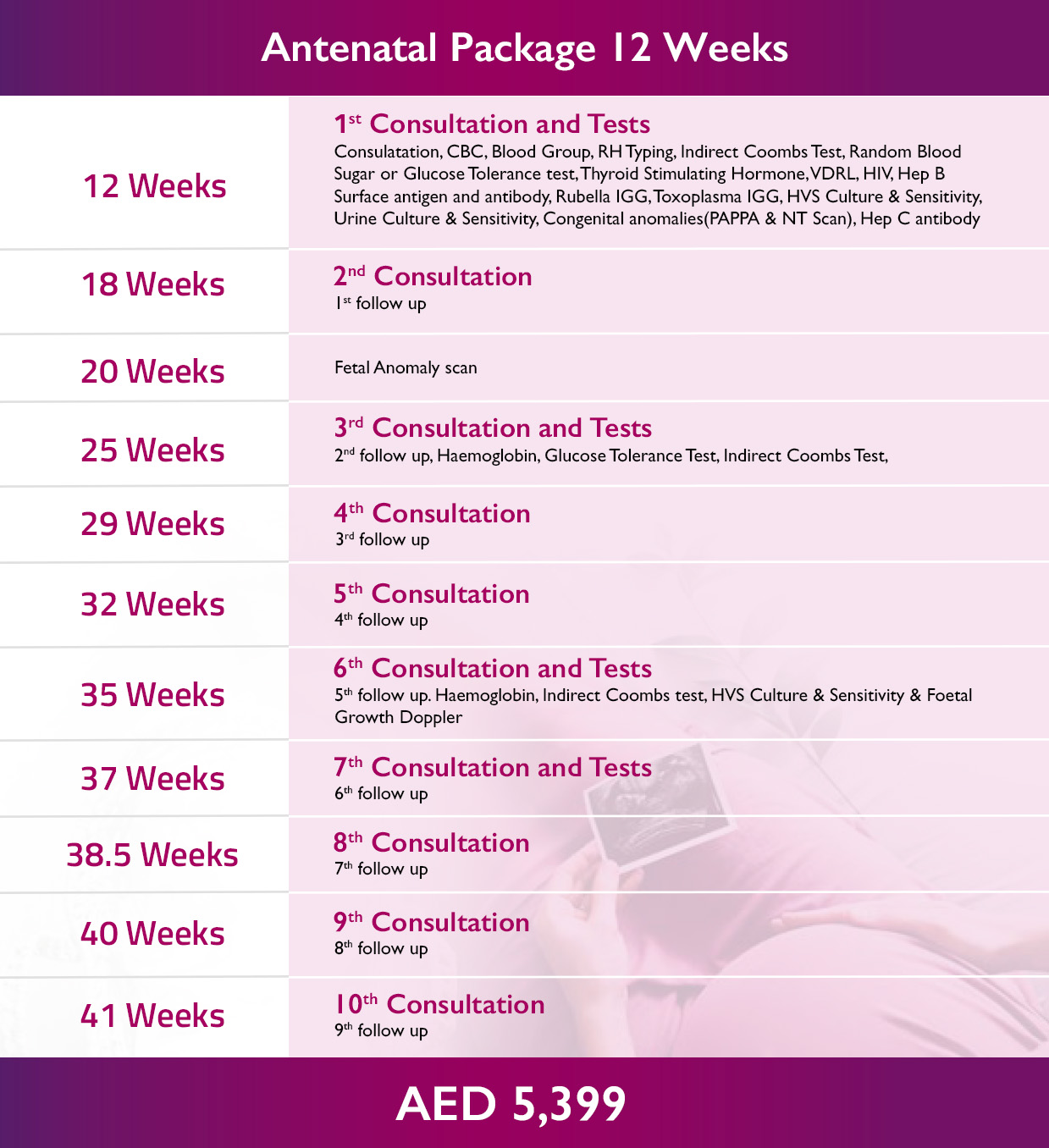

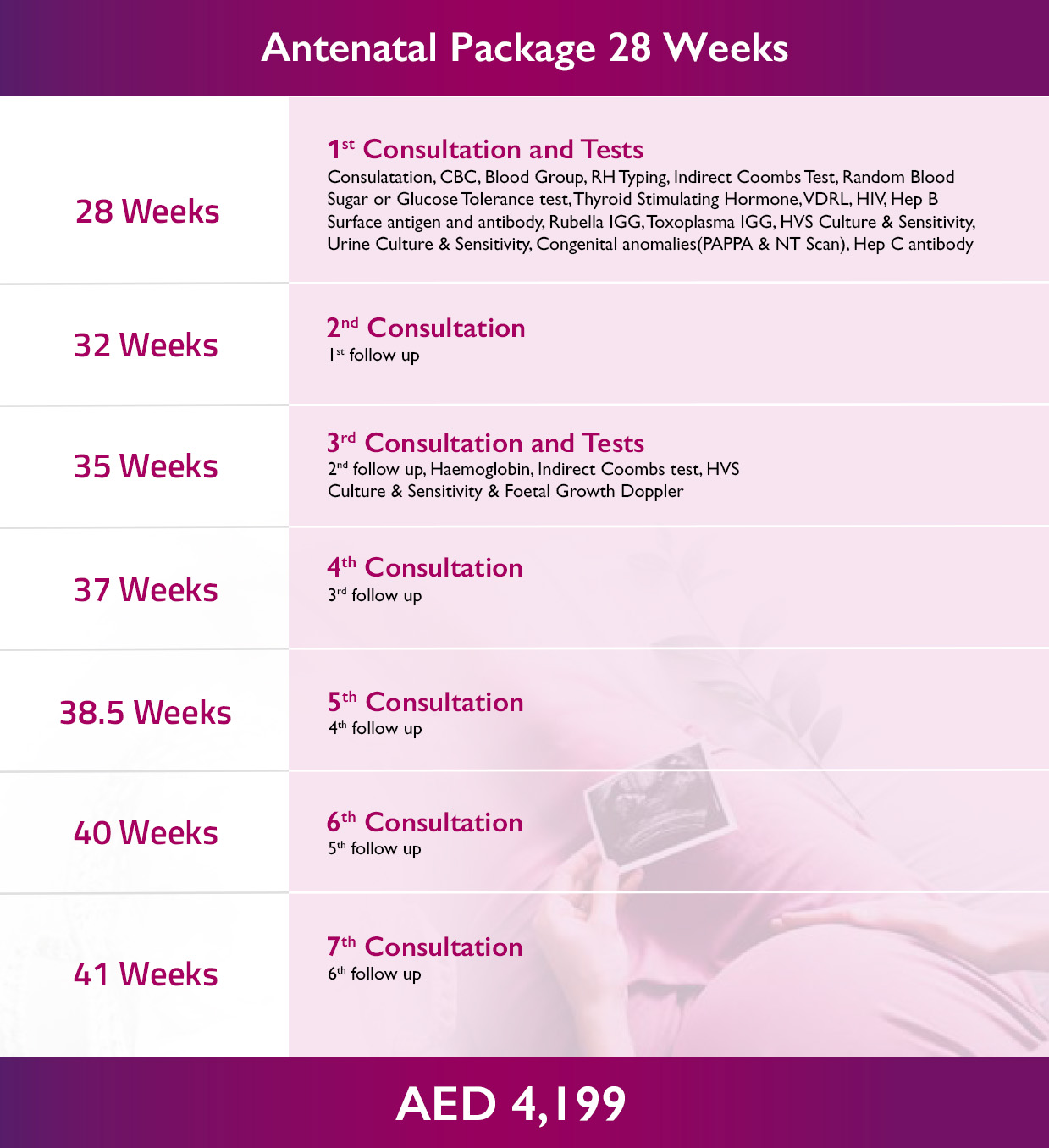

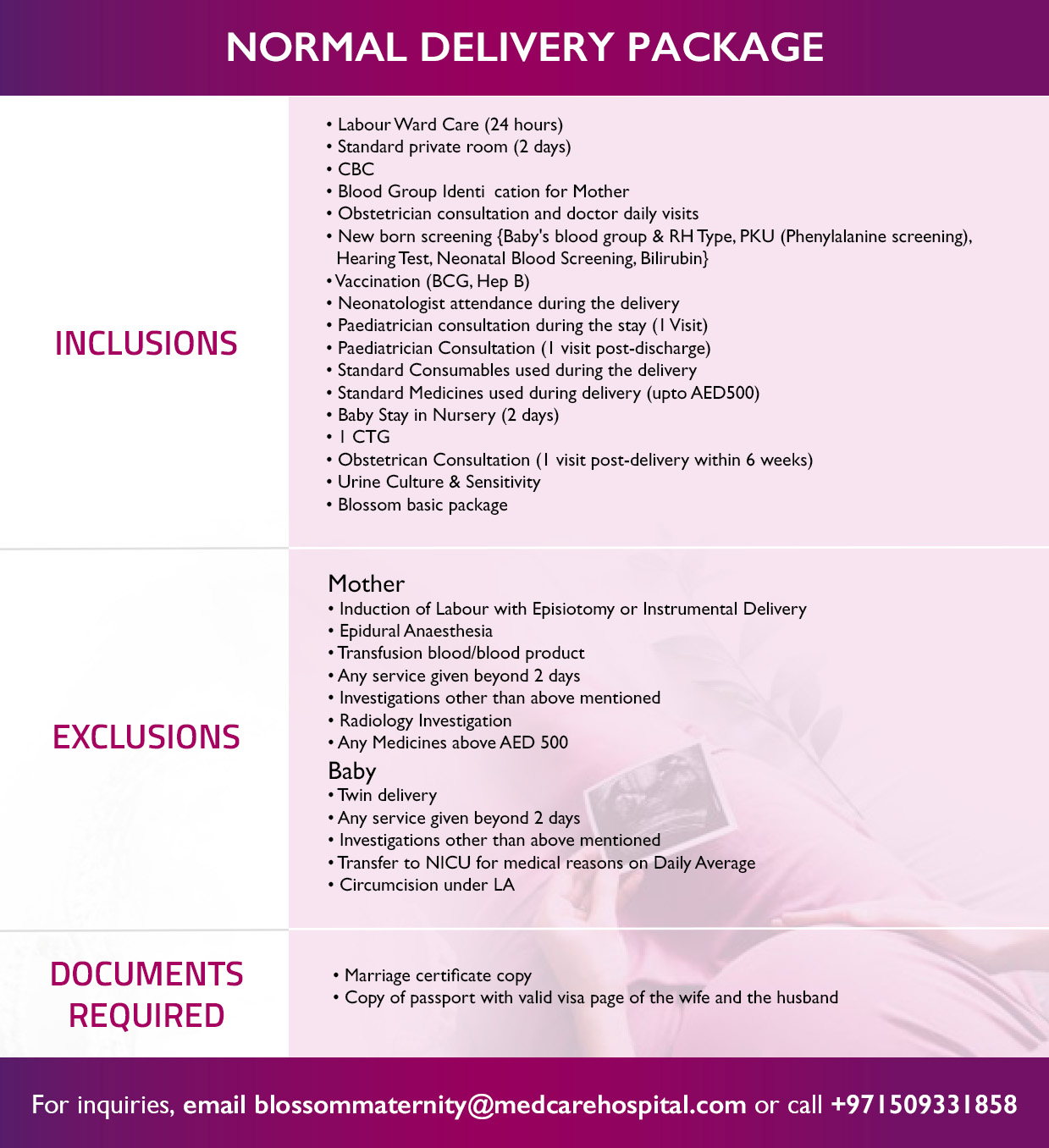

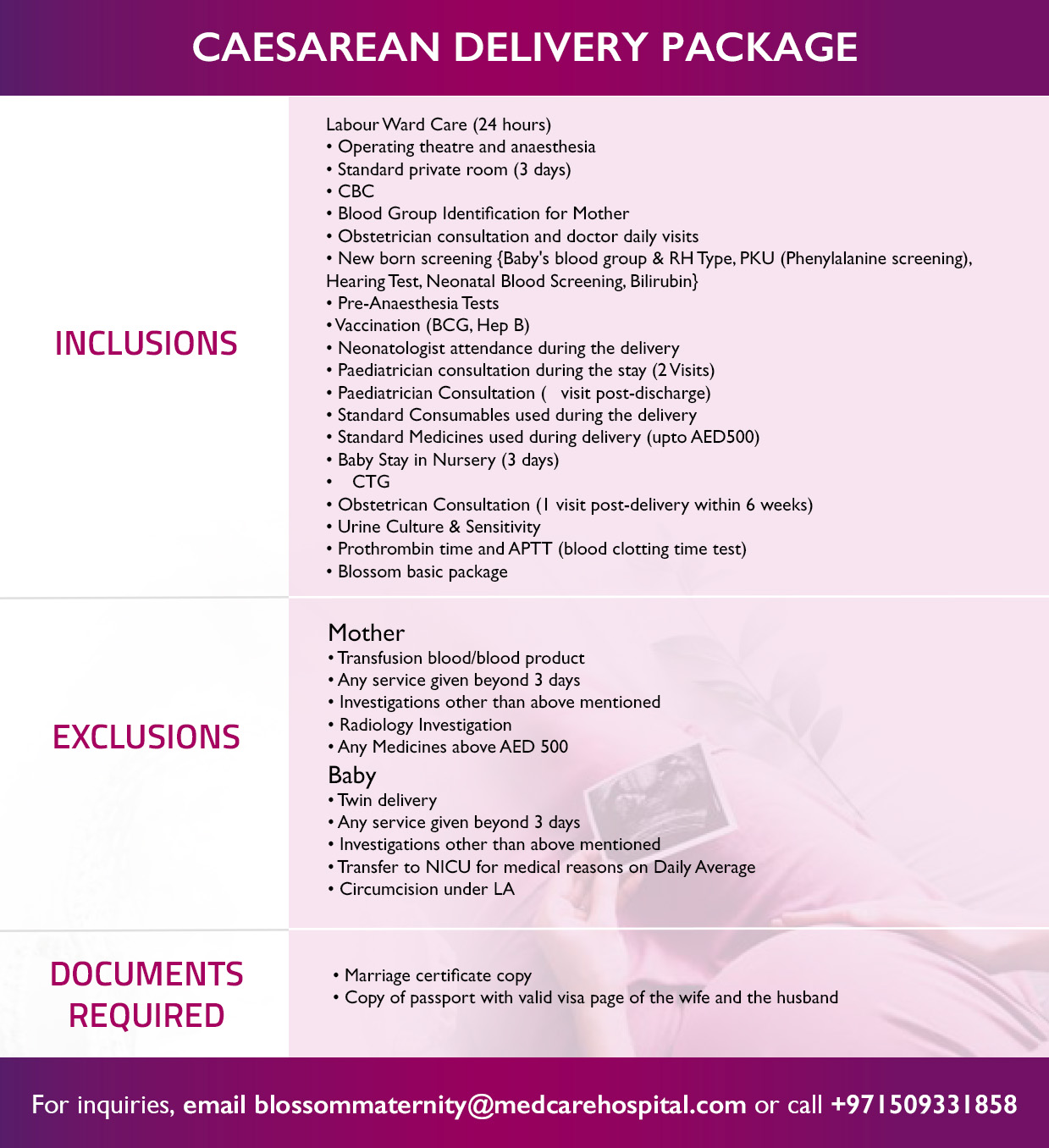

Maternity and antenatal packages at Medcare Hospital, Sharjah.
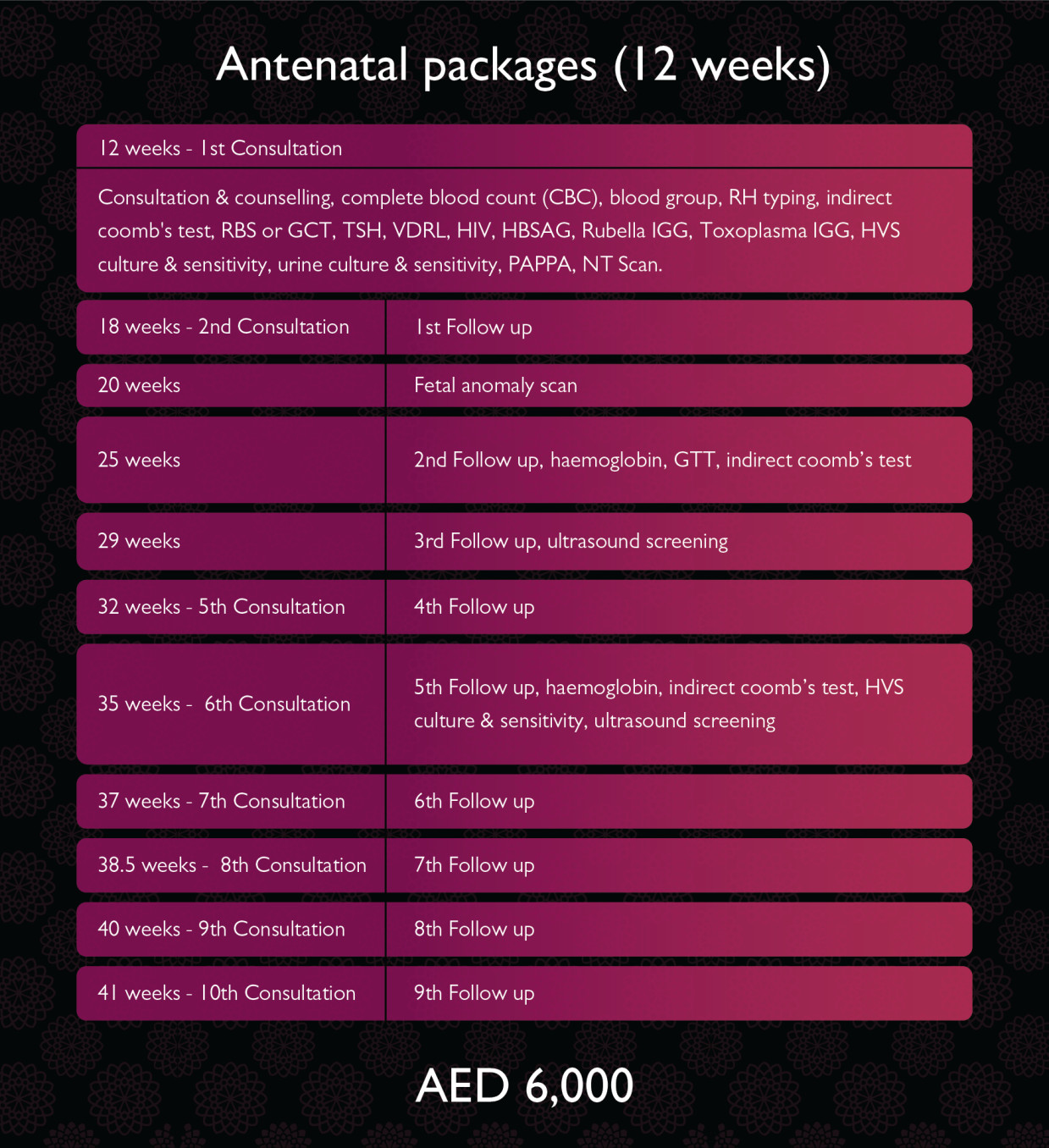
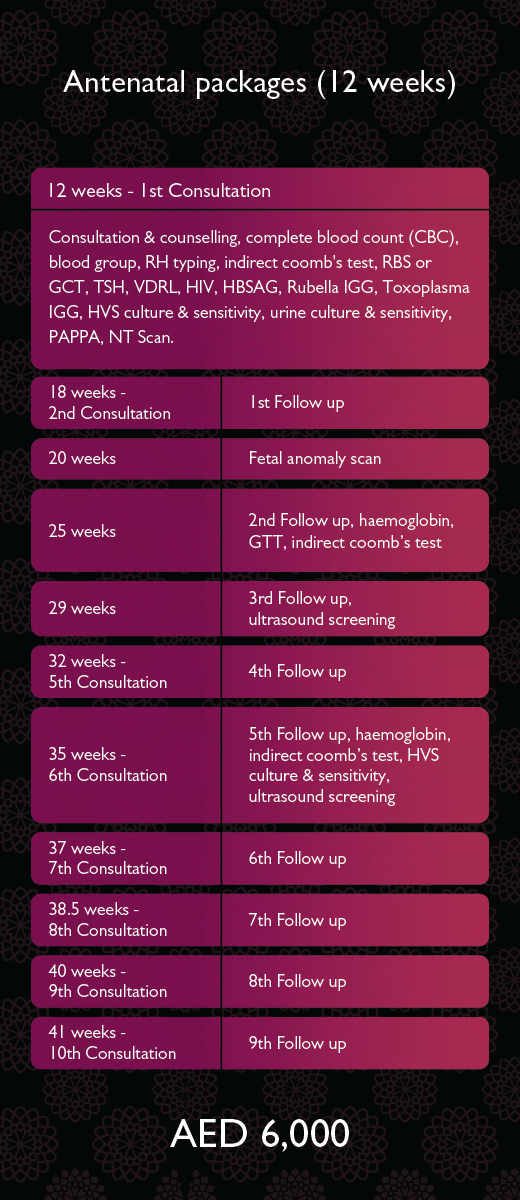
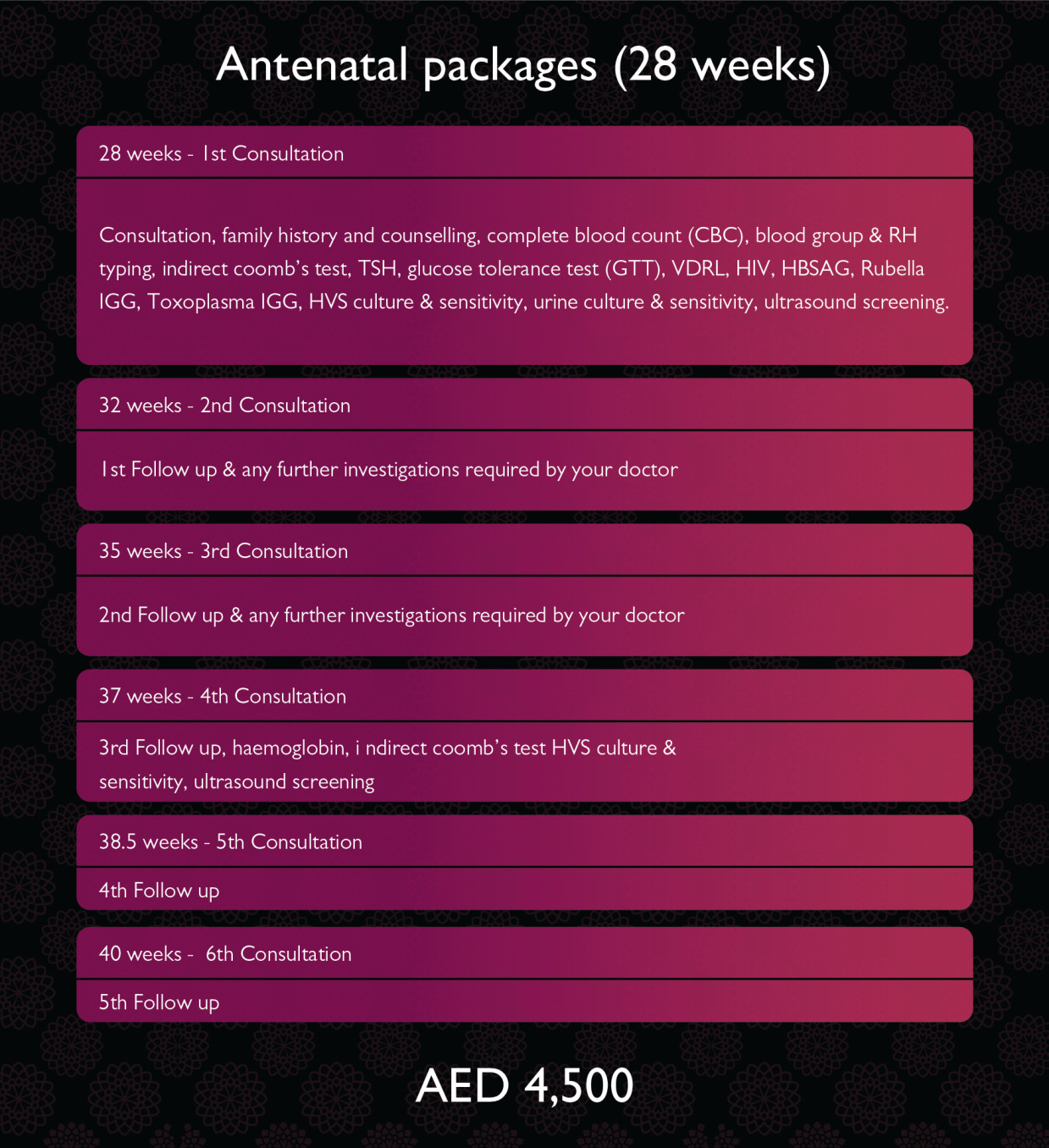
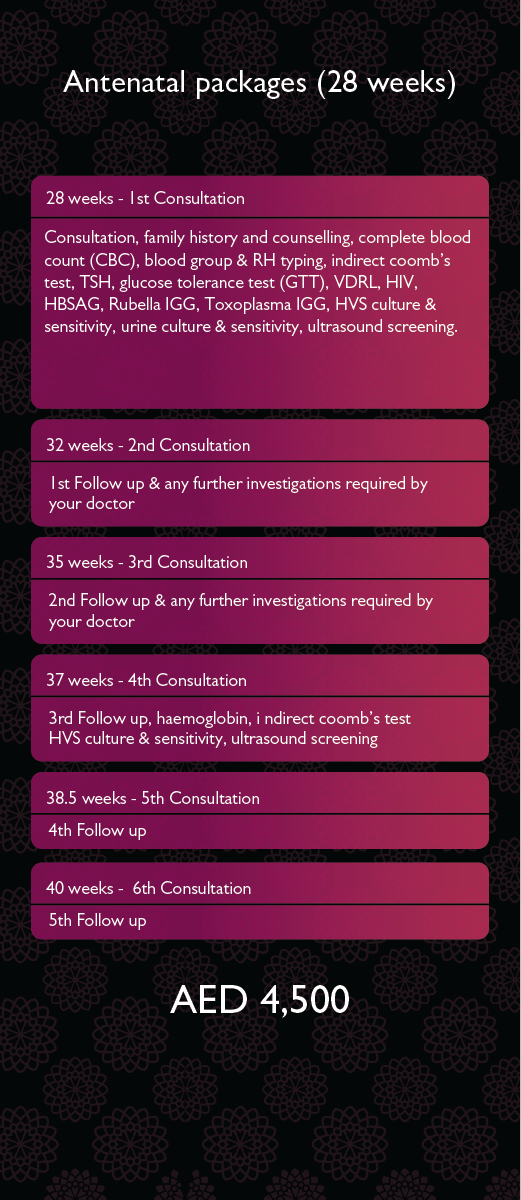
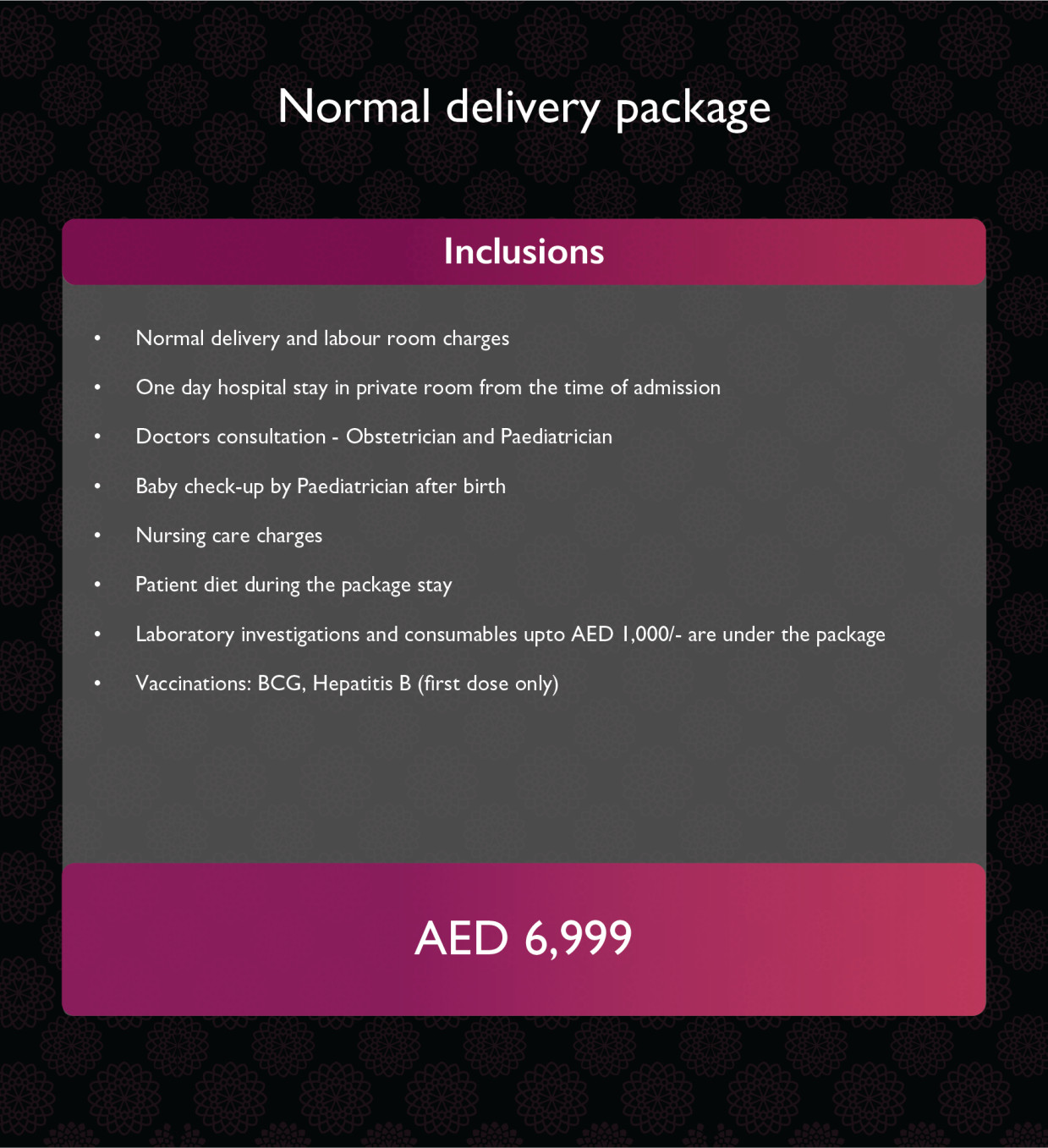
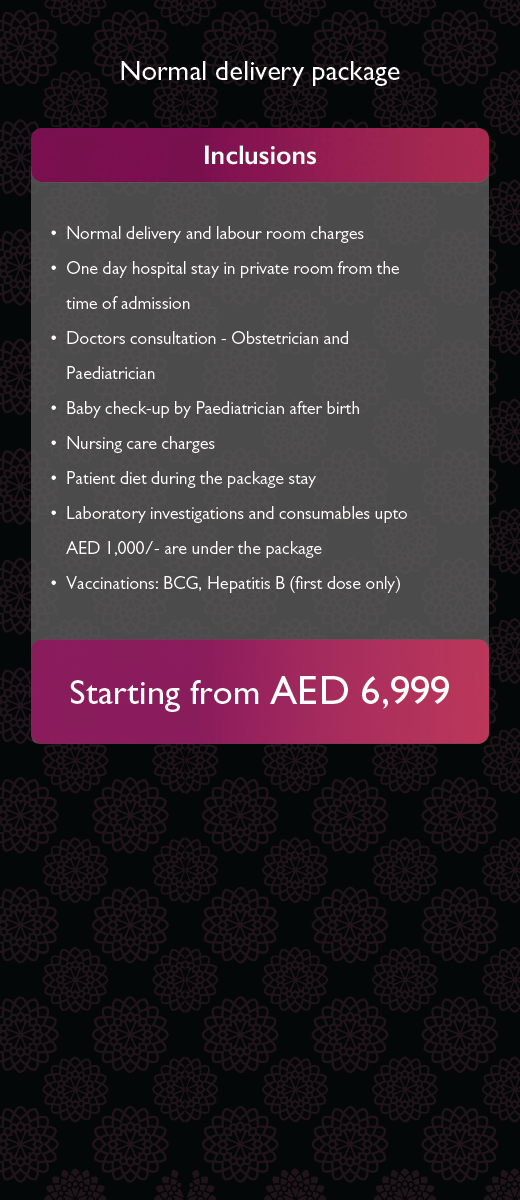
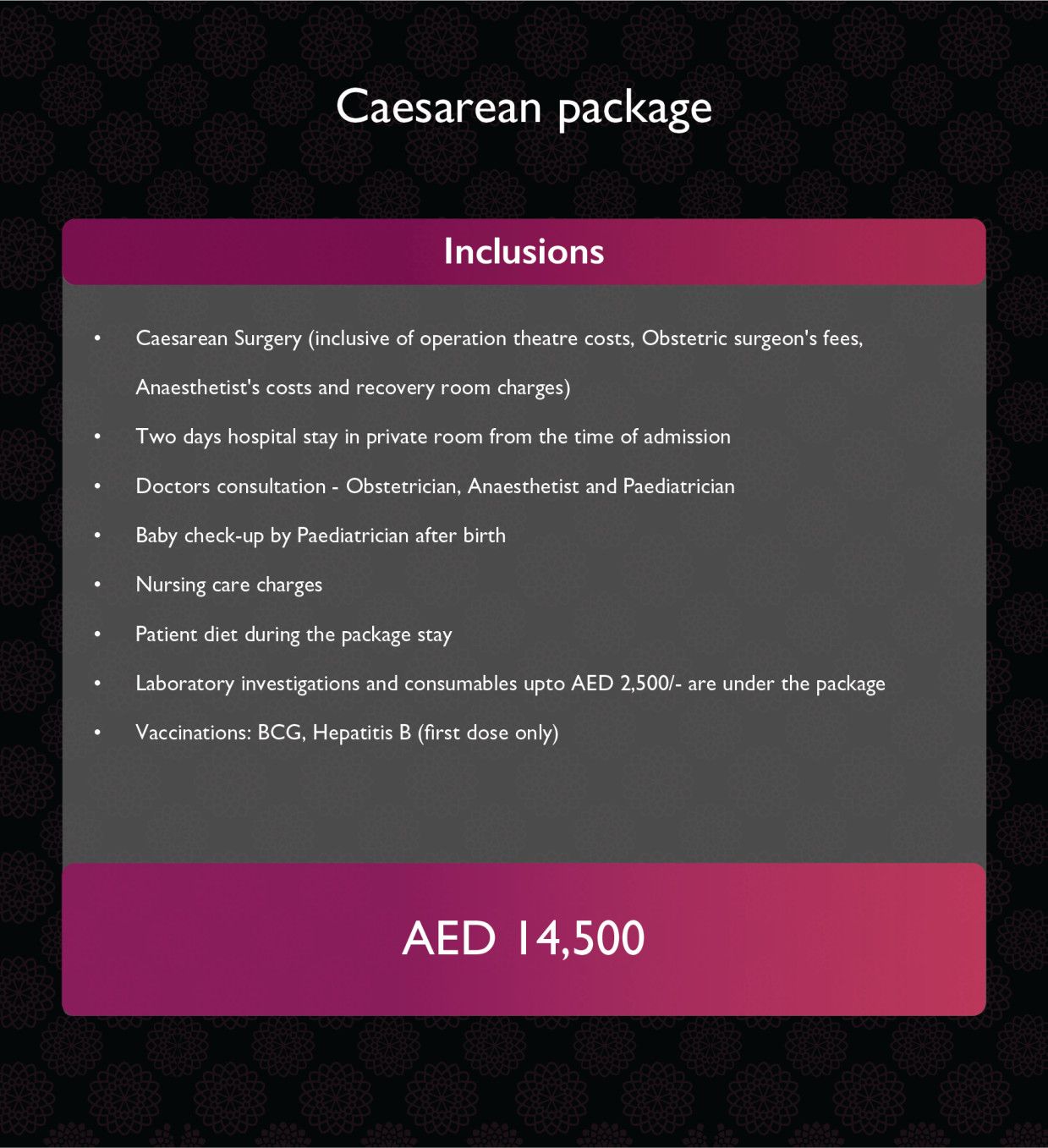
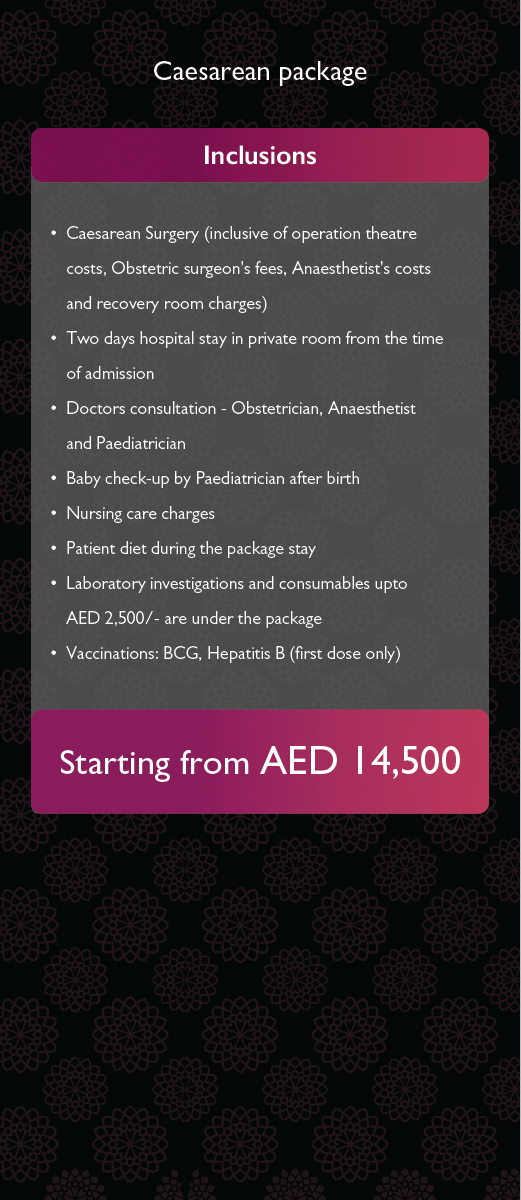
Maternity Journey:
Deciding to have a baby is one of the most important decisions in the life of a woman, as well as the family. There are many reasons why you will need the best doctors and medical care. An expectant mothers’ body is a whirlwind of hormonal and physical changes which requires careful monitoring and care at each stage, not forgetting the care and monitoring for the ‘little miracle’ rapidly growing inside.
Risk Factors During Pregnancy/Maternity:
Pregnancy in itself puts the mother through stress due to the natural changes. However, some pregnancies maybe riskier than other. This is dependent on the mothers pre-existing health.
- Pre- existing medical conditions, especially high blood pressure, diabetes, or autoimmune disorders, liver/ kidney diseases, infections, etc.
- Overweight and obesity increase the risk of complications during pregnancy and childbirth.
- Multiple pregnancies – twins or higher order pregnancies.
- Maternal age – lesser than 20 years or above 35 years poses risk to the mother.
- Previous bad obstetric history.
Prenatal Check-up At Our Maternity Hospital:
Once you test positive for pregnancy, you require prenatal check-ups at regular intervals. These are necessary even if no problems are suspected. During these prenatal visits to your obstetrician, the doctor will monitor your health and your baby’s development, prescribe nutrition or supplements.
In addition to these routine prenatal visits, you should contact your doctor if you notice any of the following:
1. Vaginal bleeding.
2. Excessive nausea or vomiting.
3. High fever.
4. Vaginal discharge or itching.
5. A burning sensation when passing urine.
6. Severe pain in the leg or head.
7. Flare up of existing conditions such as blood pressure, asthma or thyroid disorders.
Diagnosis During Pregnancy/Maternity:
During your prenatal check-ups, your obstetrician will check for any possible complications such as anaemia, gestational diabetes, high blood pressure, foetal health issues. Your doctor will conduct physical exams, and suggest blood tests or ultrasound exams, as necessary.
We offer 3 routine scans to every pregnant woman who consults us:
11- 14 weeks scan (FTS) during the first trimester:
This is a critical period, marked by rapid changes for both you and your baby. These scans help doctors rule out Down syndrome, anencephaly, cleft lip,abnormal placenta function and other abnormalities in the foetus. These scans reveal the age of the baby and if there are multiple pregnancies. Meet your doctor to understand what to expect and what to be careful about.
You need to take extra care because the pregnancy is very fragile. Morning sickness is at its worst during the first trimester and sometimes there is loss of appetite accompanied by an aversion to certain smells or food. Your breasts will feel tender and swollen and as the pregnancy progresses you may feel out of breath sometimes as the baby pushes up into your lung space.
18 – 22 weeks (Anomaly /level 2/target scan) during the second trimester:
These scans check the health and position of the placenta, water level and baby’s growth. This is the best period of pregnancy. For most women the symptoms of morning sickness go away and they are restored to their former energetic selves. Your nipples turn dark and you experience itching and stretchmarks.
Regular visits to your doctor remain important during the second trimester. Share all your anxieties and apprehensions with your doctor so he may be able to assist you. Your doctor will monitor your baby’s heartbeat using Doppler ultrasound test.
28 – 35 weeks (growth scan) during the third trimester:
The growth scan is done primarily to check the speed of growth, foetal heart rate and measurements that denote proper growth. This is a difficult time as you may experience back pain, leg cramps, heartburn, hemorrhoids, swollen ankles, warm body temperature, and tiredness. Consult your doctor if you have excessive ankle swelling.
You will feel your baby move and kick, it’s a great time of joy and exhilaration! Continue to visit your doctor regularly and learn how to smoothly manage the final stages of your pregnancy. At any time if you experience symptoms of severe abdominal pain, significant bleeding or extreme dizziness, call your doctor immediately.
Pregnancy/ Maternity Care at our Medcare Maternity Hospital in Dubai & Sharjah, UAE
- Your obstetrician may prescribe certain nutritional supplements for overall health. Or if you have a specific condition such as anaemia, you may be asked to take iron and folic acid supplements.
- If the baby’s development is not as expected, then you will be given special care, such as bed rest, or if necessary, an early delivery.
- Conditions such as gestational diabetes or high blood pressure will be controlled by medications.
- A few conditions, such as placenta previa, require bed rest.
- In case preeclampsia is diagnosed, hospitalisation may be necessary.
- In case the delivery happens before the full term, both mother and baby will need special care.
Pregnancy/ Maternity FAQs:
Pregnancy/ Maternity FAQs:
Inclusions:
-
Are there any foods I should avoid while I’m pregnant?
A: You should be careful about your diet so that you remain healthy and your baby grows well. You can eat seafood, but avoid consuming too much of it, as a lot of seafood contains mercury these days. When consuming eggs or meat, ensure they are properly cooked and not raw. All fruits and vegetables should be properly washed before eating. Avoid excessive consumption of tea and coffee, and avoid drinking alcohol & smoking.
-
Why are my ankles and feet swollen during pregnancy?
A: Some swelling of the ankles and feet during pregnancy is normal. But if you notice sudden onset of swelling of limbs or increase in swelling associated with facial puffiness, headache, blurring of vision, sharp abdominal pain or vaginal blessing contact your doctor immediately. This could be a sign of preeclampsia, in which high blood pressure and protein in the urine develop after the 20th week of pregnancy.
-
If I suffer from a headache or a cold or a fever during pregnancy, can I take the medications I have always been taking?
A: You should discuss with your doctor and get a list of the medications that are safe for you to use while pregnant. Generally, aspirin is not advised during pregnancy. It is best to take only those medications that are approved by your doctor.
-
How will I recognise the onset of labour?
A: The signs of labour vary from woman to woman. You should look out for the following:
- You need to urinate more frequently
- A clear or pink or slightly bloody mucous discharge. Labour may follow soon after this, or after a few days.
- Labour contractions cause a dull pain in your abdomen or lower back. These come regular at closer intervals and increase in intensity.
- Rupture of the amniotic fluid, also called ‘bag of water breaking’. An odourless and clear or light coloured fluid discharge.
-
What are the very first signs of pregnancy?
A: Pregnancy symptoms can start showing within a few weeks of conceiving, i.e. even before you start missing your periods.
The very early signs of pregnancy are tender or swollen breasts. Your breasts may also appear fuller and heavier. Slight spotting and bleeding, known as implantation bleeding, is common and occurs because the fertilised egg has attached to the lining of the uterus. This is often confused with regular menstrual cycles but lasts for a much shorter duration.
Other signs may include fatigue, headache, nausea, dizziness, mood swings, food cravings and constipation. Thus, taking a home pregnancy test or better yet, consulting a doctor will help you recognise your pregnancy early on.
Feel like you are experiencing a few of these symptoms? Visit a Medcare gynaecologist today.
-
When should I go to the doctor to confirm pregnancy?
A: A lot of women don’t realise they’re pregnant till a few weeks have passed. Early symptoms of pregnancy such as spotting and slight bleeding, which occur when the fertilised egg is attached to the lining of the uterus, are often mistaken for a short menstrual cycle. The same applies to other early symptoms such as fatigue, headaches, mood swings, and nausea, which are similar to PMS symptoms.
However, if you suspect you’re pregnant or have recently had intercourse without protection, you should ideally visit the doctor eight weeks after your last menstrual cycle. Your doctor will then do a physical examination including a pap smear, cervical culture, and also ask you to get blood work done to confirm the pregnancy.
Not sure what your symptoms mean? Visit a Medcare gynaecologist today for an accurate diagnosis.
-
What does it mean to be high risk pregnancy?
A: A high-risk pregnancy occurs when the health and possibly, the life, of the mother and the foetus could be in danger. Pregnancy can become high-risk either during its course or before conception.
Right from the age to the weight, certain pre-existing factors can lead to a high-risk pregnancy. Women who are too old or too young tend to have higher chances of developing gestational diabetes and preeclampsia during pregnancy. Overweight or obese women may also see an increase in blood pressure and are susceptible to complications during pregnancy and childbirth. This may lead to stillbirths, premature births or emergency C-sections.
Worried that you may develop a high-risk pregnancy? Book an appointment with a Medcare specialist today.
-
How to choose a Hospital which can manage a high risk pregnancy?
A: The first thing you must do is ascertain whether the doctors of the hospital and the staff are trained to manage such pregnancies and what experience they have with such cases. Another fact to check is if they have the right equipment to deal with possible complications during pregnancy and childbirth.
You should also find out if the hospital has additional units that will help you when the time comes. Common instances of high-risk pregnancies include the mother being too young or old, or if a woman is carrying twins or triplets. If the hospital has an additional team to deal with such cases, it can help you beyond the scope of pregnancy-related issues.
At Medcare Maternity Hospital in Dubai & Sharjah, UAE, our doctors and staff are trained to cater to high-risk pregnancies. Book a consultation today to ensure safe childbirth.
-
What is Level 4 NICU?
A: In high-risk pregnancy cases, both you and your baby would need special care, especially neonatal care. Hospitals can have different levels of neonatal care that can cater to the advanced needs of premature babies.
When a hospital classifies as a Level 4 Neonatal Intensive Care Unit (NICU), it means that it is capable of caring for babies as young as 22 to 24 weeks gestational age and who weigh less than 1 pound 12 ounces. Level 4 NICU hospitals are equipped with advanced respiratory support and are adept at performing various surgeries that a micro-preemie may need. Not every hospital earns the Level 4 NICU status, as high-tech equipment, trained doctors and staff to respond to such critical situations are required to acquire that status.
Need a consultation for a high-risk pregnancy? Book an appointment with a Medcare specialist today.

